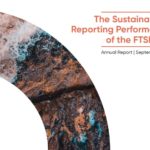Tighter laws in the US are making it easier to tap telephones and monitor people reading material that is critical of the US. These and other inroads into civil liberties have contributed to the US falling eight places to 25th position in this years Country Rating conducted by oekom research.
As in the previous year, the Scandinavian countries, headed by Norway, have come out on top. Germany was able to improve on its placing with a rise from twelfth to tenth position, while Mexico, Turkey and Russia finished, as in 2002, at the bottom of the ranking. The Country Rating produced by the Munich-based rating agency evaluates 30 OECD countries and Russia according to 150 environmental and social indicators. It forms the decision-making basis for some ten bond portfolios according to sustainable-development principles and administering a total volume of more than 300 million euros.
If today in the US you a buy a book by a left-leaning author or a critique of the war in Iraq, there is a chance that you will be subject to a thorough personal investigation by the FBI and the CIA. For banks, bookshops, hospitals and credit-card companies in the United States are obliged under the "Patriot Act to provide information about their customers. The package of laws was introduced after September 11 and is designed to help prevent terrorist attacks. Fear of terrorism has also led to more stringent laws in Italy, Canada and Spain. In contrast to the situation in the US, however, oekom research was unable to identify in those countries any restrictions on individual liberties.
In the US, fear of terrorism has also resulted in a tightening of the asylum laws. People from 44 countries in which terrorist groups are active are automatically first taken into custody when they submit an application for asylum in the United States. Finally, Australia, too, has reaped criticism of its asylum policy. There, the internment camps for illegal asylum-seekers have been dubbed "concentration camps by critics because of the poor living conditions they offer.
The results of the "Political system and basic rights section of the rating reflect developments in the US very closely. The US, lying well beaten and far behind the leading countries of Finland, Iceland and Denmark, was only able to take 29th place. Germany lay just a slight distance behind the top countries in seventh place.
In the "Environmental pollution section of the study, issues of climate protection were at the fore. The Kyoto Protocol, which obligates industrialized countries to cut emissions of the major greenhouse gases like carbon dioxide (CO2) by five per cent by 2012 to below 1990 levels, played a prominent role here. The Protocol will come into force when the countries ratifying it account for at least 55 per cent of CO2 emissions in the base year of 1990. 27 OECD countries, most recently Japan and Switzerland, have now ratified the Protocol. Turkey has not signed the treaty to date, while the USA and Australia are strictly refusing to ratify it. The question of whether the Protocol will ultimately be approved now depends on Russia. The Russian Federation produces almost 15 per cent of the worlds CO2 emissions and has held out the prospect of ratifying the treaty. In doing so, Russia would profit principally from the trade in emissions certificates which would enable the country to sell a portion of its earlier cuts in greenhouse-gas emissions of around 33 per cent to countries which are short of their target.
The scale of efforts by countries to cut their emissions has to date varied enormously. The UK for example was able to reduce its CO2 emissions between 1990 and 2000 by 13 per cent by switching from coal to gas. In Germany, climate-protection measures and the decline of industry in eastern Germany each accounted for half of the 19 per cent fall. In other countries, by contrast, CO2 emissions have risen over the same period this is the case in Japan, Canada and Spain, for example.
The "Environmental Pollution section of the study with subsections covering Air, Energy, Soil, Water, Biodiversity and Waste, made up 70 per cent of the environmental rating. Norway and Sweden were able to chalk up the most points here. Germany finished in seventeenth place and thus, compared internationally, falls far short of meeting the self-imposed claim of Environmental World Champion.
The rating of countries sustainability performance is increasingly establishing itself as a mainstay of the process of investing in ethical and environmental bonds. This rapidly growing form of investment is particularly favoured by more risk-averse investors like church institutions, foundations or insurance companies. "Our Country Rating occupies the position of market leader in the German-speaking countries, says Robert Haßler, CEO of oekom research AG.



